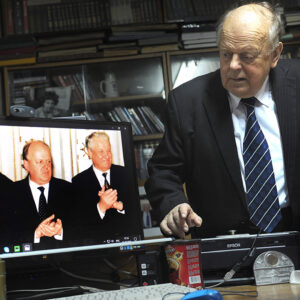Lives and legacies of Shushkevich and Kravchuk who buried the Soviet Union

Stanislau Shushkevich, the first leader of independent Belarus, who signed the Belavezha Accords to dissolve the Soviet Union, died on 3 May 2022. Just one week later, his Ukrainian counterpart, Leonid Kravchuk, also passed away.
Both leaders’ lives reflected the fate of their countries after 1991, in constant battle with Soviet ghosts from the past. Shushkevich lost Belarus’ first independent presidential election in 1994, which paved the way for authoritarianism in Belarus. Kravchuk made history as the first president of an independent Ukraine.
The Belarusian regime denied Shushkevich the respect he was due. In later life, they withheld Shushkevich’s pension. And in death, they refused him a place at the prestigious Minsk cemetery. By contrast, Kravchuk received a state funeral attended by current and former Ukrainian presidents.
Shushkevich’s way

Stanislau Shushkevich. Image: BBC.
In April 2022, Stanislau Shushkevich, 87, was hospitalized in an intensive care unit, suffering complications from Covid-19. He died at home on 3 May. In his capacity as the first head of independent Belarus, together with Russian President Boris Yeltsin and Ukrainian President Leonid Kravchuk, he signed the Belavezha Accords on 8 December 1991, dissolving the Soviet Union.
Born in 1934 to a family of teachers, Shushkevich spent his childhood in Nazi-occupied Minsk. His family hid a Jewish boy in their house, risking execution at the hands of the Nazis. After the war, he studied physics, completed a doctorate, and built an academic career. Shushkevich entered Belarusian politics as a deputy of the BSSR Supreme Soviet in 1990. After becoming the speaker of the Belarusian parliament in 1991, he served as the first official head of independent Belarus, although executive power rested with the prime minister.
Shushkevich’s political career declined as he lost his position in early 1994. He ranked fourth in the country’s first presidential elections that year, losing to pro-Russian populist Alexander Lukashenka. According to political analyst Valer Karbalevich, Shushkevich’s reputation suffered because he appeared too centrist to deal effectively with multiple crises, despite the fact he was not head of the executive branch.
Under Shushkevich’s leadership, the white-red-white national flag and historic Pahonia coat of arms (now associated with Belarusian independence and democracy) became official state symbols by the minimum required majority of 231 votes. In an interview from 2019, Shushkevich recalled the strong pro-Russian mood among political elites in early 1990.
In late 1993, Shushkevich signed the Commonwealth of Independent States Collective Security Treaty. Shushkevich opposed the treaty but was pressured to sign by pro-Russian deputies. This step drew Belarus closer into Moscow’s orbit.
In 1995, Shushkevich became a deputy in the 13th Supreme Soviet of the Republic of Belarus. He did not recognise the results of the 1996 constitutional referendum, which had significantly increased Alexander Lukashenka’s powers at the expense of the Belarusian legislature. Shushkevich refused to join the modified lower chamber of parliament, the House of Representatives.
Kravchuk and Shushkevich
Born in the same year as Shushkevich, Kravchuk came from a family of farmers in western Ukraine and made a career in a Communist Party, dealing with propaganda and ideology. In July 1990, he became the chair of the Ukrainian Supreme Soviet and then, in 1991, the first president of independent Ukraine. Like Shushkevich, Kravchuk lost his country’s 1994 presidential elections to the pro-Russian candidate, Leonid Kuchma.
After the dissolution of the Soviet Union, Ukraine had the world’s third-largest nuclear arsenal, while Belarus possessed nuclear missile launchers. Under Kravchuk and Shushkevich, both countries gave up their inherited Soviet nuclear armaments. Western countries welcomed the move. But domestically, their decisions remain controversial.

Former Ukrainian presidents pay their respects at Kravchuk’s funeral. From left to right: Viktor Yushchenko, Leonid Kuchma, and Petro Poroshenko. Image: Reuters.
As part of the 1994 Budapest Memorandum, the US, the UK, and France guaranteed Ukraine, Belarus, and Kazakhstan their independence within existing borders in exchange for relinquishing their nuclear armaments. But Russia’s annexation of Crimea in 2014 and the full-scale Russian invasion of Ukraine in 2022 lay waste to the memorandum’s assurances.
Despite the controversial perceptions of Kravchuk in Ukraine, he secured a place in his country’s history through his genuine support for Ukrainian independence. Even though Kravchuk and Russian President Boris Yeltsin both came from the nomenklatura, Kravchuk understood that Russia didn’t want an independent Ukraine—even as the Soviet Union fell apart.
The professor versus the populist
In many ways, Shushkevich was a complete antipode to Lukashenka, who came to power in Belarus in 1994. Shushkevich openly described Lukashenka as an uneducated person, who gave away Belarus’ independence to Russia.
Lukashenka, in his time as a member of the Belarusian Parliament, lied about Shushkevich in his notorious anti-corruption report. In 1997, he froze Shushkevich’s pension, which subsequently dropped in value to $0.20 per month. Belarusian media reported that his wife finally managed to secure him a minimum social pension in 2015.
In September 2021, state authorities removed Shushkevich’s name from school textbooks following his critical comments about the rigged 2020 presidential election. After he passed away earlier this month, the authorities denied Shushkevich’s family a place at the prestigious Minsk cemetery where many prominent Belarusians are buried.
Shushkevich’s funeral made a stark contrast to the state funeral for Kravchuk in Kyiv on 17 May. The Shushkevich family decided on a private funeral service at St. Mary’s Catholic Cathedral in Minsk. Shushkevich had been instrumental in reinstating the cathedral’s status as a church in the 1990s. No state officials were formally present to pay their respects. Lukashenka ignored the funeral. Although some state media briefly reported on Shushkevich’s passing, they failed to mention his role in recent Belarusian history. Belarusians bid him farewell.
CEU Press is releasing the English translation of Shushkevich’s memoirs, A Life for Belarus: The Fall and Postmortal Rise of the USSR, in November 2022.







